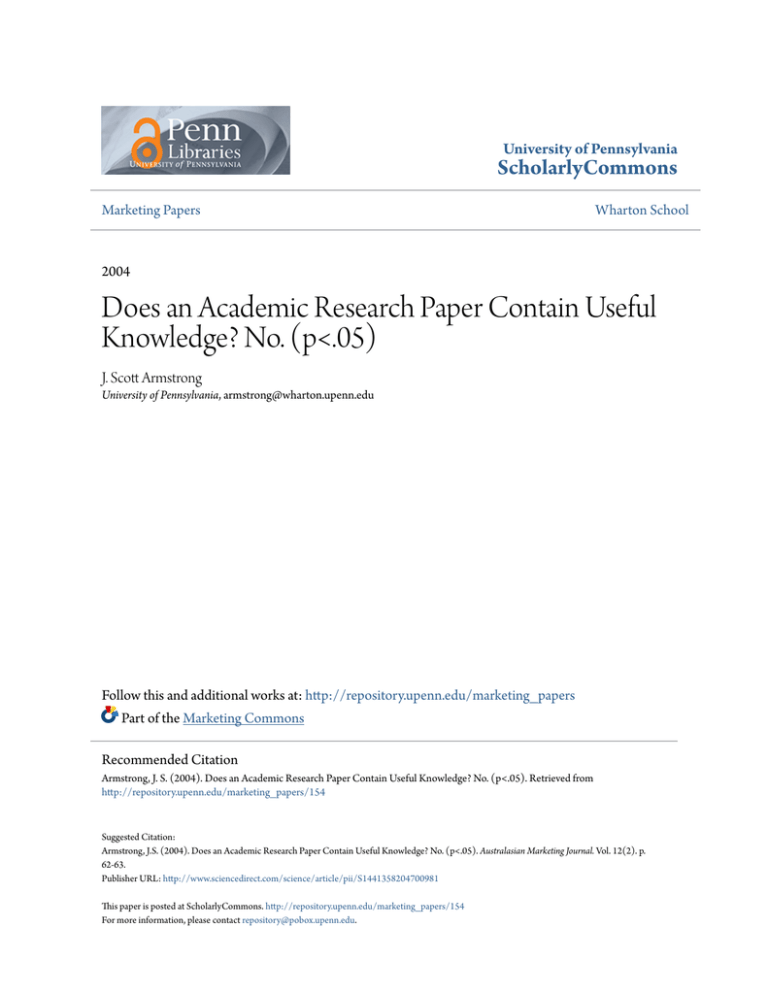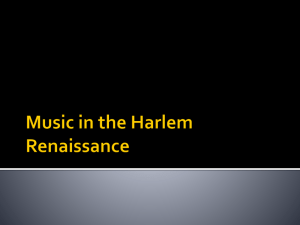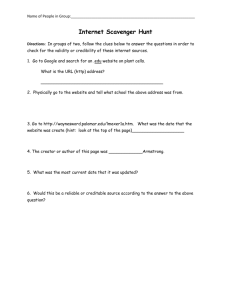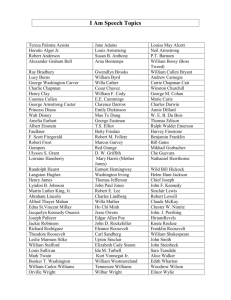Does an Academic Research Paper Contain Useful Knowledge? No
advertisement

University of Pennsylvania ScholarlyCommons Marketing Papers Wharton School 2004 Does an Academic Research Paper Contain Useful Knowledge? No. (p<.05) J. Scott Armstrong University of Pennsylvania, armstrong@wharton.upenn.edu Follow this and additional works at: http://repository.upenn.edu/marketing_papers Part of the Marketing Commons Recommended Citation Armstrong, J. S. (2004). Does an Academic Research Paper Contain Useful Knowledge? No. (p<.05). Retrieved from http://repository.upenn.edu/marketing_papers/154 Suggested Citation: Armstrong, J.S. (2004). Does an Academic Research Paper Contain Useful Knowledge? No. (p<.05). Australasian Marketing Journal. Vol. 12(2). p. 62-63. Publisher URL: http://www.sciencedirect.com/science/article/pii/S1441358204700981 This paper is posted at ScholarlyCommons. http://repository.upenn.edu/marketing_papers/154 For more information, please contact repository@pobox.upenn.edu. Does an Academic Research Paper Contain Useful Knowledge? No. (p<.05) Disciplines Business | Marketing Comments Suggested Citation: Armstrong, J.S. (2004). Does an Academic Research Paper Contain Useful Knowledge? No. (p<.05). Australasian Marketing Journal. Vol. 12(2). p. 62-63. Publisher URL: http://www.sciencedirect.com/science/article/pii/S1441358204700981 This journal article is available at ScholarlyCommons: http://repository.upenn.edu/marketing_papers/154 Does an Academic Research Paper Contain Useful Knowledge? No (p<.05) Commentary on the Mort et al. Paper Does an Academic Research Paper Contain Useful Knowledge? No (p<.05) J. Scott Armstrong Assume that you are handed a paper randomly selected from an academic journal in your field. What is the likelihood that it contains useful knowledge? Along with Ruth Pagell, a librarian for the Goizetta Business School at Emory University, I conducted an analysis to estimate the percentage of published papers in forecasting that contain useful knowledge (Armstrong and Pagell 2003). We defined useful knowledge as evidence that could contribute to better decisions than would have otherwise been made in given situations. We concluded that only 3% met this definition. My opinion, supported by an analysis of literature in marketing (Armstrong 2003), is that the percentage of useful papers in marketing is even lower. When I posted a message to this effect on ELMAR (a listserve for marketing academics and practitioners), some sent messages with concurring opinions, and there were no messages from those who objected. [The essay is in full text at http://jscottarmstrong.com under ELMAR, February 27, 2004.] Now, if less than 3% of published papers are important, should we apply the usual statistical rules and assume that a paper is unimportant since p is less than .05? Practitioners seem to make this assumption, as few read the academic literature. Academicians behave in a similar manner when it comes to applying research studies relevant to their roles as teachers and researchers. For example, despite research showing that teacher evaluations are detrimental to learning, reduce the quality of services rendered to students, reduce student satisfaction, harm morale among faculty, and are expensive, I am unaware of any schools that have acted on this research. (I had asked for such examples in an Essay that I posted on ELMAR.) 1. The Effects of Publishing Rankings of Journals Mort, et al. (2004) provide descriptive evidence on the perception of academic journals. They do not translate this into advice and they recognize that there are concerns 62 Australasian Marketing Journal 12 (2), 2004 about how to use their findings. I expect readers will come away with the conclusions that researchers should send their papers to the most prestigious journals, and that schools should judge the quality of a paper by the reputation of the journal in which it appears. This might be helpful advice for those who are trying to advance their careers, but does it help to advance the development of useful knowledge? I think not. Published rankings of journals are likely to increase the number of submissions to the most prestigious journals. Valuable resources will then be devoted to selecting which of these papers to publish, which will lead these journals to develop “fair” rules for acceptance. This implies basing acceptance on the reviews by referees. As shown in Armstrong and Hubbard (1991), this reliance on the views of reviewers will reduce the chances of publishing useful knowledge because important papers receive harsh reviews. To compound the problem, schools will base their judgments of faculty on where their papers have been published, an inexpensive and “fair” procedure, rather than whether the research has made an important contribution to knowledge. The latter criterion is more difficult to assess and might be attacked as being unfair. Interestingly, business schools that adhere most slavishly to evaluations based on the quality of journals tend to be those that are making few scientific contributions (Van Fleet, et al., 2000). Throughout history, people have gone to great lengths to suppress the progress of scientific advances. Outstanding scientists have been subject to ostracism and capital punishment. Our modern–day means are more humane, of course. Privately, many scientists agree that the system does not work, yet they feel powerless to make substantive changes and are forced to settle for simple cosmetic changes. The current procedures for faculty evaluation inhibit scientific progress. However, there are alternative procedures for evaluation of faculty that can Does an Academic Research Paper Contain Useful Knowledge? No (p<.05) encourage rather than inhibit the development and communication of useful knowledge. 2. Proposals to Increase Contributions to Knowledge My primary suggestion is that schools directly assess the usefulness of research. They could ask faculty to write short reports (perhaps one page with appendices) on what they discovered, how they made the discovery, and how they can demonstrate that the findings can lead to better decision making. My guess is that fewer than 10% of active academic researchers in business schools will be able to write a convincing statement about the potential value of their research efforts. To avoid bias in the evaluation of faculty, I propose that those making the judgments initially do so “journalblind”. That is, the summary would not say where the findings had been published. The assessment of researchers could also draw upon objective measures. For example, citations can be used to assess usefulness to researchers. Readership and mass media coverage provide ways of assessing usefulness to practitioners. Journals should focus on publishing papers with useful findings. To accomplish this, editors could ask reviewers to suggest improvements instead of offering an opinion about whether a paper should be published. (I have adopted this role as a reviewer for journal articles.) This would improve papers and would not hamper editors in selecting papers that they judge to make the most useful contributions. Researchers should focus on doing useful research. If they have something important to publish, they should make it available in a journal. It does not matter that much whether the journal is the most prestigious, because the real task begins after publication. Given that most academicians and practitioners assume that academic papers have no value, authors need to convince them otherwise. You should: Show that findings from your approach are useful. To do that, put the findings in the form of principles. “Given conditions x, y and z, you should do A, not B.” Include this in the abstract. We found that in forecasting, only 13% of the papers reported findings and how they were obtained in their abstracts (Armstrong and Pagell 2003). Make your findings freely available on websites. Papers that are freely available on the web will be read more. For example, in 1998 I published a paper in the Marketing Bulletin, a journal that is freely available on the web. Although this journal had one of the lowest rankings in the survey by Mort et al., my paper is visited about 1,300 times per year. I expect that readership of this paper is higher than for almost all of my other 100-plus papers. Post the paper on your website (or if the journal does not permit this, post the working paper prior to its publication). I have put all of my papers on my website; this has helped to double my citation rate over the past five years. An assessment system aimed at recognizing useful findings would aid scientific progress. Why would researchers waste time conducting obscure studies if they can see no benefit to themselves? References Armstrong, J. S., 2003. Discovery and communication of important marketing findings: Evidence and proposals. Journal of Business Research 56 (1), 69-84. Armstrong, J. S. and Pagell, R., 2003. Reaping benefits from management research: Lessons from the forecasting principles project. Interfaces 33 (6), 89-111. Armstrong, J. S. and Hubbard, R., 1991. Does the need for agreement among reviewers inhibit the publication of controversial findings? Behavioral and Brain Sciences 14, 136-137. Mort, G.S., McColl-Kennedy, J.R., Kiel, G. and Soutar, G.N., 2004. Perceptions of marketing journals by senior academics in Australia and New Zealand. Australasian Marketing Journal 12 (2), 51-61. Van Fleet, D. D., McWilliams, A. and Siegel, D.S., 2000. A theoretical and empirical analysis of journal rankings: The case of formal lists. Journal of Management 26, 839-861. Biography J. Scott Armstrong is Professor of Marketing at The Wharton School. Author of Long-Range Forecasting (1985) and editor of Principles of Forecasting (2001). For details of his publications consult http://www. jscottarmstrong.com For the past few years he has been trying to summarize all “useful principles” in advertising (http://advertisingprinciples.com) and forecasting (http://forecastingprinciples.com). Correspondence Address J. Scott Armstrong, The Wharton School, University of Pennsylvania, Philadelphia PA 19104. Email: armstrong@ wharton.upenn.edu Australasian Marketing Journal 12 (2), 2004 63


